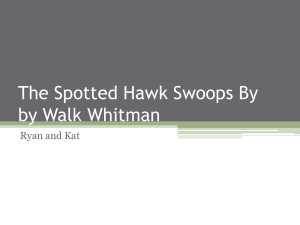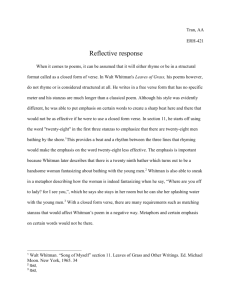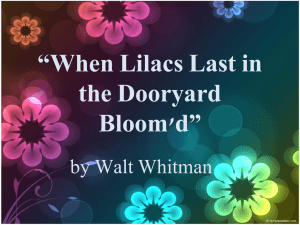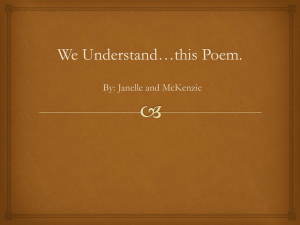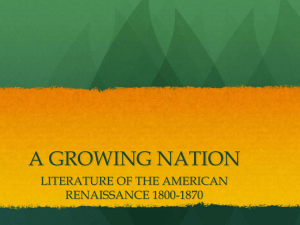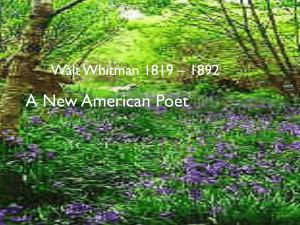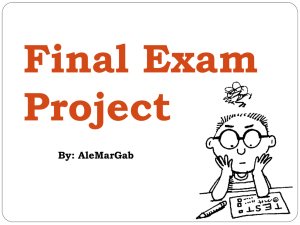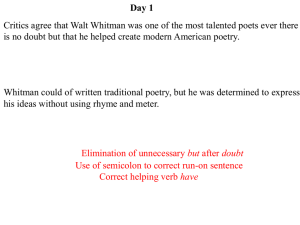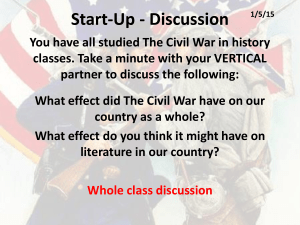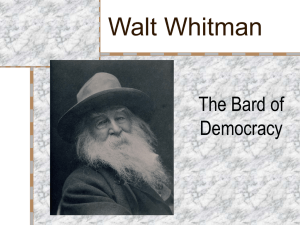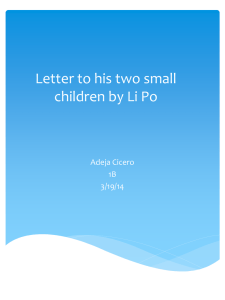File - Mr. McElroy`s Class
advertisement
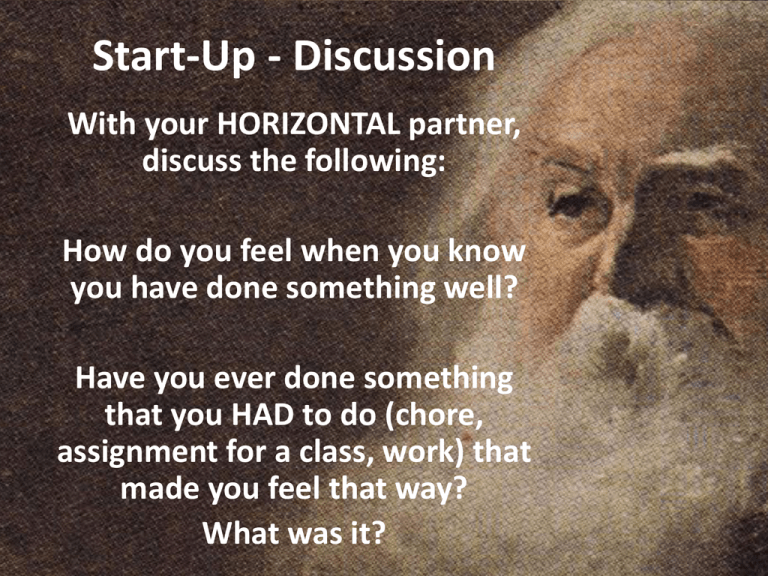
Start-Up - Discussion With your HORIZONTAL partner, discuss the following: How do you feel when you know you have done something well? Have you ever done something that you HAD to do (chore, assignment for a class, work) that made you feel that way? What was it? Start-Up - Writing Now write about it: What was it that you did well? How did you feel knowing you had done a great job at it? Walt Whitman • Walt Whitman was one of the most prominent poets of the 19th century • Walt Whitman was born in 1819 on Long Island. • Whitman generally does not use any form of rhyme scheme or meter in his poems. He wrote mainly in Free Verse. • He was a Transcendentalist. Transcendentalism • A BELIEF IN A HIGHER REALITY NOT VALIDATED BY NORMAL SENSE OR REASON • THE INDIVIDUAL IS THE SPIRITUAL CENTER OF THE UNIVERSE • ALL KNOWLEDGE BEGINS WITH SELF KNOWLEDGE • INDIVIDUAL VIRTUE AND HAPPINESS ARE DEPENDENT ON SELF-REALIZATION • NATURE IS A LIVING MYSTERY Free Verse • Free verse is poetry that is free from limitations of regular meter or rhythm and does not rhyme with fixed forms. • Such poems are without rhythms and rhyme schemes; do not follow regular rhyme scheme rules and still provide artistic expression. In this way, the poet can give his own shape to a poem how he/she desires. “I Hear America Singing” • This poem is Whitman’s hymn to America. • It is his direct experience of America and Americans. • Read the poem to yourself. • The poem has three sections. In the notes for the Introduction answer two questions: 1. What is personified? 2. Why did Whitman choose these words: “varied carols” ? The Catalogue • What literary device does he use the most? Underline the examples of it. • Is his use of this device effective? • Whitman celebrates who and what in the catalogue? • Why does he include women at the end of the catalogue? Last Lines • Explain the first line of this section in your words. • In the Catalogue was the focus on a group or on individuals? Does it switch in this section? • How does he end the poem? Does it tie in to his first line? How? Exit Ticket • Do you know someone who really loves their work? • If yes, what evidence of that do you see in them? • If no, then how important do you think it is for people to love what they do? Homework • Complete your worksheet on “I Hear America Singing.” Make sure to answer all the questions. • It will be due, completed, tomorrow. Start-Up - Discussion 12/5/14 In “I Hear America Singing,” Whitman talks about how each person contributes their own “varied carols” to the song of America. With your VERTICAL partner, discuss the following question: Why is diversity so important to who we are as a nation? Start-Up - Writing Now answer the following in writing: What do you plan to do after high school (for a job/career)? WHY do you feel that is the right choice for you? How will what you do add to the song of America? Objective By the end of the period, students will analyze and be able to understand the themes of Whitman’s “Song of Myself, Number 52.” They will be able to identify literary devices used. CCSS.ELA-LITERACY.RL.11-12.2 CCSS.ELA-LITERACY.RL.11-12.4 CCSS.ELA-LITERACY.RL.11-12.9 “Song of Myself” • First published in 1855, without a title, as part of his collection Leaves of Grass, the work we now call "Song of Myself" just might be the most important and influential American poem out there. • It represents a huge break from the formal traditions of the past. • The poem has also helped shape the idea of what it means to be an American. It is a "democratic" poem that draws all different kinds of people and places into itself and tries to forge them into a unity. • It is divided into 52 sections. We will be looking at the final piece of the poem. “Song of Myself” Throughout this poem, Whitman tells us a bit about what he believes… • Everyone is equal, including slaves. • Truth is everywhere, but unspeakable. • An invisible connection and understanding exists between all creatures. • Death is a fortunate thing and not something to fear. • People would be better off if they had faith in the order of nature (and death is part of this order). • People should take pride in themselves. “Song of Myself, Number 52” • Read through the poem with your group; each person take a section and read it out loud. “Song of Myself, Number 52” In your notes, answer the following questions: 1. When Whitman sees the hawk, what is it complaining about? What literary device is he using? 2. How does Whitman say that he and the hawk are alike? 3. What is a yawp? 4. Why does Whitman say that he sounds his “barbaric yawp?” watch “Song of Myself, Number 52” 1. What does Whitman personify in lines 5-8 and where does it lead him? 2. The ending of day is a metaphor. What do you think it represents? 3. Where does he tell the reader to look for him? How does this reinforce the metaphor? “Song of Myself, Number 52” 1. What does Whitman mean when he says he will be “good health” to the reader? 2. If the reader fails to find him, what does he say to do? 3. What do you think Whitman believes about death? 4. How does the last line show his beliefs about death and the connection between all creatures? Exit Ticket Look at this picture. Think about BOTH of the Whitman poems we read and answer the following: Would you say that these daisies are all the same or all different? What do you think Whitman would say? Are we, as people, all the same or different? What would Whitman say about that? Extra Credit Opportunity Whitman believed in making his voice heard … sounding a “barbaric YAWP.” For Extra Credit: Sound YOUR barbaric YAWP Sometime this weekend or next week, you must: 1. Go out into a public place (if on campus, it MUST NOT BE DURING CLASS TIME) in a crowd of unsuspecting people. 2. Have someone videotaping you. 3. Sound a “BARBARIC YAWP” and record their reactions. 4. Email the video to me by next Friday.
